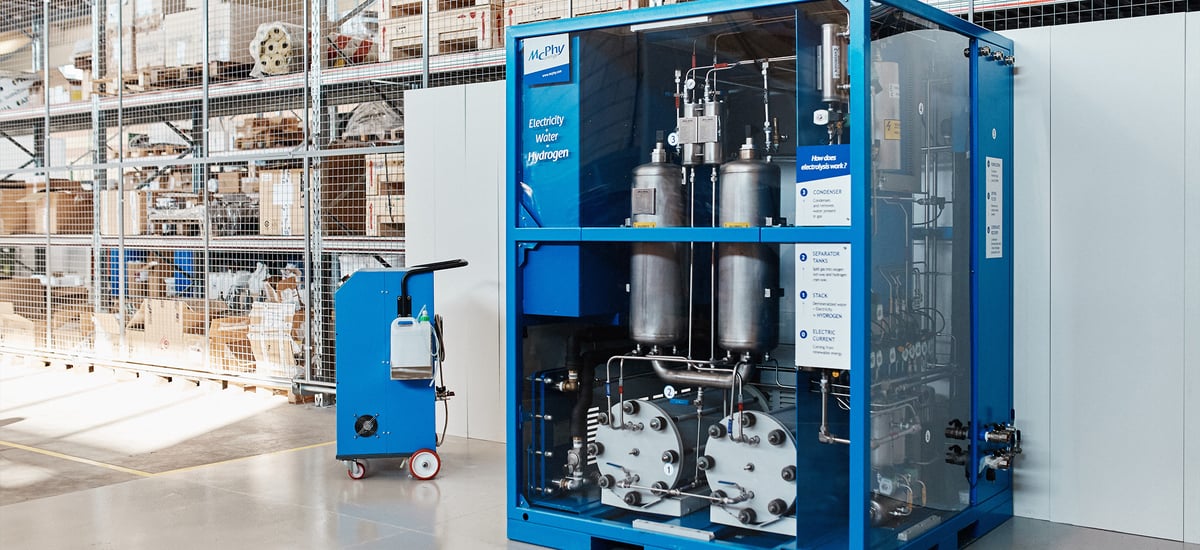
Green Hydrogen: A Boost for Climate Action—and Investors?
Reaching net zero by 2050 requires a major push. Is green hydrogen the best technology to achieve net zero—and does that present an opportunity for investors?
Hydrogen has long been identified as key in the transition to a decarbonized energy system, but it has traditionally been produced in ways that generate greenhouse gases. Green hydrogen—produced using renewable electricity sources—could solve that problem.
Green hydrogen is an energy source that can provide clean and efficient energy for vehicles and industrial processes. And it can accelerate decarbonization of even hard-to-green sectors, adding an emission-free alternative to the decarbonization mix, alongside fossil fuels that currently provide four-fifths of the world’s energy supply and create the majority of global greenhouse gas emissions.
So, how do we build an economy powered by green hydrogen?
The immediate challenges are capacity and cost. Green hydrogen is currently a scarce resource, and an expensive one because of factors such as production and transportation costs. Meeting increasing demand begins with energy companies investing in renewable energy sources, developing advanced electrolysis technologies, and scaling up production facilities. Increasing the production of green hydrogen will likely bring its cost down, making its use a viable commercial proposition and supporting the wider renewable energy sector, which is central in the global effort to address climate change.
For investors looking to invest in the opportunities this presents, BlackRock helps clients understand how they may be able to mitigate risk and capture opportunity associated with climate change and the transition to a low-carbon economy. Having identified this transition as a megatrend—a long-term driver of change poised to disrupt many aspects of the global economy—the firm seeks to connect investors to these opportunities.
“Climate change and resource scarcity are arguably the biggest challenges for our generation,” says Rob Powell, Head of Thematic and Sector Product Strategy at BlackRock. “We’re seeing opportunities arise for companies in many different sectors to contribute to and benefit from the transition to a low-carbon economy.”
From climate crisis to climate opportunity
While much of the discussion around climate change has centred on the challenges, deploying commercially mature renewable power technologies could address them. Today, the focus has widened to explore the opportunities that disruptive technologies present to increase climate action momentum.
The hydrogen sector and its opportunities are growing rapidly. Hydrogen projects attracted $240 billion in proposed investment as of September 2022, according to the Hydrogen Council—a figure that grew 50% since November 2021.
Green hydrogen specialist McPhy Energy is supporting this growth in Europe, and over the next few years, it aims to dramatically scale up its manufacture of equipment to produce and distribute hydrogen.
“We have a major role to play in the decarbonization value proposition,” says Jean-Baptiste Lucas, McPhy’s CEO. “We’re aware of the drastic need to cut CO2 emissions, and hydrogen technology brings concrete solutions that could be implemented to substitute for CO2-emitting technologies. One of the main challenges is to scale up production and move from proof of concept to full-size industrial equipment. We need larger manufacturing sites and factories.”
McPhy believes that hydrogen has the potential to reduce reliance on carbon-intensive fossil fuels. Hydrogen production is a zero-carbon process when renewable electricity is used to electrolyze water, producing green hydrogen, which is a far more carbon-efficient fuel than diesel or natural gas.
The French government agrees, and has provided funding to McPhy toward the construction of a new “gigafactory” in Belfort, in northeastern France, that is expected to add up to a gigawatt of annual hydrogen production capacity.
Green hydrogen expands
The momentum behind hydrogen is gathering pace. According to the October 2022 Bloomberg Intelligence hydrogen commodity report, it will likely play a pivotal long-term role in achieving the ambitious decarbonization and energy-independence goals set by the European Union and other jurisdictions. While European green hydrogen production capacity is still very limited, the EU expects the uptake of renewable and low-carbon hydrogen to almost quadruple, from 5.6 to 20 million metric tons, by 2030.
In the US, the Inflation Reduction Act and Infrastructure Investment and Jobs Act have allocated approximately $13 billion in tax credits for low-carbon hydrogen, pushing the country toward a potentially world-leading position in the funding of H2 projects.
Globally, PwC forecasts that demand for all forms of hydrogen will accelerate from 2030 onward to reach 150 to 500 million metric tons annually by 2050. While green comprises a small segment of this projected total, its potential to decarbonize industries makes it a mega force, which BlackRock is helping clients access.
Meeting net-zero emission targets is a huge undertaking requiring huge investment—but that long-term investment could deliver long-term returns for investors. However, identifying and accessing opportunities has not been easy, and few stock indexes give broad exposure to the mega forces that BlackRock has identified, which are digital disruption and artificial intelligence, the future of finance, a fragmenting world, the low-carbon transition and demographic divergence. To explore these megatrends, the firm has launched a dedicated Thematic Research Investment Group.

Sustainable—and commercially viable
In 2021, the Hydrogen Council estimated that more than 200 projects existed across the hydrogen value chain, from production to retail, comprising $300 billion of investment through 2030 if all projects come to fruition. Of this, $80 billion was considered to be in the mature phase, and subsequent investments have continued to scale up the manufacture of hydrogen equipment such as electrolyzers, which will play a crucial role in lowering the production cost of green hydrogen.
“By 2024, we’ll have 1.3 gigawatts of capacity,” says Lucas. “So, most likely, there will be a need for more factories and capacity to keep our market share and ride the wave of hydrogen growth in the next 10 years.” This could take McPhy into other markets such as North America and Asia, suggests Lucas, who says that once its European footprint is secure, “the world is full of opportunities for hydrogen development.”
BlackRock recognizes that investing in companies that contribute to and benefit from the transition to a low-carbon economy is something many clients want to do but need help doing. As Powell puts it, “Clients know why they want to invest in the transition, but don’t always know how. BlackRock is here for the how.”
Risk Warnings
Capital at risk. The value of investments and the income from them can fall as well as rise and are not guaranteed. Investors may not get back the amount originally invested.
Important Information
This material is for distribution to Professional Clients (as defined by the Financial Conduct Authority or MiFID Rules) only and should not be relied upon by any other persons.
In the UK and Non-European Economic Area (EEA) countries: this is Issued by BlackRock Investment Management (UK) Limited, authorised and regulated by the Financial Conduct Authority. Registered office: 12 Throgmorton Avenue, London, EC2N 2DL. Tel: + 44 (0)20 7743 3000. Registered in England and Wales No. 02020394. For your protection telephone calls are usually recorded. Please refer to the Financial Conduct Authority website for a list of authorised activities conducted by BlackRock. Any research in this document has been procured and may have been acted on by BlackRock for its own purpose. The results of such research are being made available only incidentally. The views expressed do not constitute investment or any other advice and are subject to change. They do not necessarily reflect the views of any company in the BlackRock Group or any part thereof and no assurances are made as to their accuracy. This document is for information purposes only and does not constitute an offer or invitation to anyone to invest in any BlackRock funds and has not been prepared in connection with any such offer.
© 2023 BlackRock, Inc. All Rights reserved. BLACKROCK, BLACKROCK SOLUTIONS, and iSHARES are trademarks of BlackRock, Inc. or its subsidiaries in the United States and elsewhere. All other trademarks are those of their respective owners.
